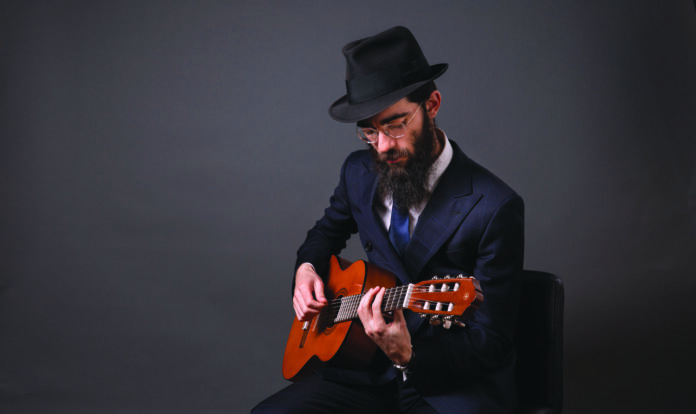The Marcus family is obviously quite musical. You’re a very popular singer, and your brothers Shmuly and Bentzion formed the 8th Day band, which has produced some very nice music.
I’m the youngest of ten siblings, six brothers and four sisters. We are all baalei menagen, but the others don’t do it professionally. Music was always a family thing. My brother Shmuly has a tremendously creative mind. He’s a true poet, and everything he writes has depth and meaning.
My brother Chaim sent me his drum set from New York when I was eight years old. Before then, I would just use whatever was around to make noise, like pencils. Up until the time I went off to yeshivah when I was 16, I’d play the drums every Friday and Sunday when I got home from yeshivah, and we played whenever there was a simchah in the community. My father is a Chabad shliach in Los Alamitos, California. When my father’s balebatim made weddings, he would tell them, “Don’t worry, my kids will be the band.” We would also play on Purim in my father’s shul and things like that.
To whom do you attribute the family’s musical talent?
Well, my mother is a Friedman. She’s a sister of Avraham Fried, and Benny Friedman is her nephew, so I would certainly attribute it to that side of the family. The Friedmans were also baalei tefillah for many generations. We have a megillas yuchsin that was written by a cousin of my great-grandfather, and aside from the stories that he includes, he mentions various zeides who were baalei tefillah, including one who was the baal tefillah in Belz for the Yomim Nora’im. My cousin Benny just told me a story he heard from one of the Bluzhever Rebbes, and it turns out that our great-great-grandfather was the baal tefillah in Bluzhev for the Yomim Nora’im. My mother’s grandfather was also a baal tefillah. We have a recording of him davening Selichos. It’s very beautiful.
Was your mother’s father a Lubavitcher?
The Friedmans were Bluzhever chasidim, but my great-grandfather, the Krenitzer Rav, was an eidim in Krenitz, and since Krenitz was very close to Bobov, my grandfather became a Bobover chasid. My great-grandfather was never actually the official rav of Krenitz; he was a rosh yeshivah. But when he came to America, the Bobover Rebbe, Rav Shlomo, referred to him as the Krenitzer Rav.
How did your grandfather and all his children end up in Lubavitch?
He came to America because he’d been offered a job teaching in Lubavitch. He lived in Crown Heights and davened in 770. He was probably one of the few people with a shtreimel in 770 in the early years, but no one else in the family wears one. At first, my grandfather sent his sons to Bobov, and they even had peiyos. But my grandmother didn’t want to have the girls in Lubavitcher schools while the boys went to a cheder of a different chasidus; she wanted the whole family to be in the same place. So the boys eventually switched over to Lubavitch, even though my grandfather always maintained a relationship with the Bobover Rebbe.
As a resort town, Krenitz was frequented by many gedolei Yisrael, including the Gerrer Rebbe, the Imrei Emes, and the Brisker Rav. Did your grandfather meet any of them?
Yes, but he was pretty young at the time. His mother was very sick. She passed away right after Sukkos of 5699 (1938). The Brisker Rav went around collecting money on Yom Tov so they could send her to a hospital in Krakow.
Did you know your grandfather?
Not very well. He was sick for the last ten years of his life.
What’s your father’s background?
He’s a baal teshuvah. He grew up in a traditional home, and when he was 14 or 15 years old, Rabbi Avremel Korf of Miami told him he had to go to yeshivah, so he did. He went to the Lubavitcher yeshivah in Newark, which is now located in Morristown, and after that he went to the central yeshivah in 770, where he was classmates with Rabbi Manis Friedman and later became his brother-in-law.
Rabbi Shais Taub, with whom you have shared a stage, told me that you have an interest in old niggunim.
I have an interest in history, and I do a lot of genealogical research. Over the last few years, I’ve gotten into trying to find old niggunim that may have been lost over the course of time.





















